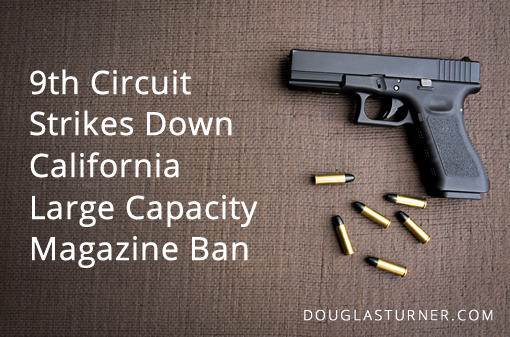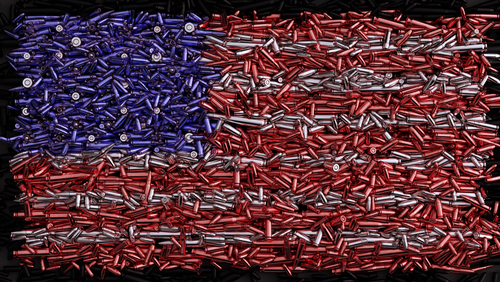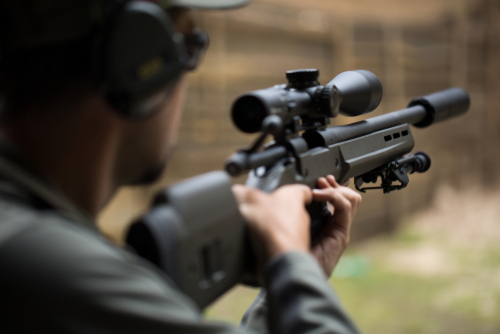H.R.2427 – NFA Modernization Act of 2021
(For a link to your Congressperson, click the link above)
Gun Trust Library
Colorado Gun Law Update – Polis Signs Two Gun Bills
Note: I use the term “prohibited person” in the video. The exact statutory language is a person ineligible to possess a firearm — which is much broader than just a prohibited person as that term is used by the federal government.
For a complete copy of the recent Colorado laws, click the links:
https://leg.colorado.gov/sites/default/files/2021a_078_signed.pdf
https://leg.colorado.gov/sites/default/files/2021a_1106_signed.pdf
Colorado NFA Trust Termination Clause
Most of our NFA trusts contain a termination clause. In most cases, the NFA trust does not terminate at your death. The trust usually continues for the longest time applicable under the rule against perpetuities.
Will You Need A Gun Trust?
 There is a new sheriff in town. His name is Joe Biden. The Biden administration has already floated the idea of applying the $200 National Firearm Act (NFA) tax to all semi-automatic rifles. The sleeper is the application of the NFA, in general, to those rifles. And for that reason, many individuals are considering a gun trust.
There is a new sheriff in town. His name is Joe Biden. The Biden administration has already floated the idea of applying the $200 National Firearm Act (NFA) tax to all semi-automatic rifles. The sleeper is the application of the NFA, in general, to those rifles. And for that reason, many individuals are considering a gun trust.
To understand the issue requires starting with the Colorado background check law enacted on July 1, 2013. The 2013 law required a background check on all Colorado gun sales. Sounds reasonable, right? Well, the law is not about gun sales. The law is about firearm possession. Anytime a Colorado firearm is handed off to anyone, the question you must ask is, is a background check and approval of the transfer required?
As originally introduced by the Colorado House, the 2013 law required a background check on almost any transfer of possession no matter how temporary. Out in the field plunking cans and your buddy wants to try out your new rifle? Background check required. Want to leave the gun in your house and available to your spouse? Background check required. Want to take your gun to a gunsmith and get it cleaned up? Background check required. Want to get the gun back from the gunsmith? Background check required. And of course, a fee each time.
When the 2013 law came out of the Colorado House, many individuals created a gun trust, identified family members who would be entitled to possession of trust firearms, and transferred their firearms to the trust. Why? So that family members need not be afraid of violating the law by sharing family firearms. To make a long story short, the Colorado Senate modified the background check law passed by the Colorado House. The Colorado Senate made exceptions including immediate family loans and gifts, gunsmiths, and loans for up to 72 hours. In my opinion, a much less onerous law than originally thought.
Until 2013, I never drafted a firearm trust for “regular” firearms (Title I Firearms). Firearm trusts were a creature of the NFA (Title II Firearms sold by a Class 3 dealer). The NFA was enacted in the 1930s when the federal government did not think it could prohibit guys like Al Capone from owning full-auto firearms – Tommy Guns. However, the federal government could tax the transfer of possession, strictly limit possession to the transferee, and require registration through a tax stamp.
The Biden Administration has floated the idea of not just taxing semi-automatic rifles like they do full autos, suppressors, short barreled rifles, and short barreled shotguns; but to have the semi-automatic rifles be subject to the entire NFA. That would mean any transfer of possession, would require an application to the Bureau of Alcohol, Tobacco, Firearms, and Explosives (BATFE or ATF), the submission of fingerprint cards and photos, $200, and a year-long wait. There would be no exceptions for a spouse, child, father, etc. There would be no exception for a gunsmith. There would be … no exceptions. The penalty for violating the NFA is up to 10 years in federal prison and $250,000 in fines.
In a properly drafted gun trust, multiple individuals can share possession of the trust firearms. Usually these are family members or members of the same household. Individuals are already conveying firearms to their firearm trusts in anticipation of the anticipated law. Many of the concerns in 2013 causing individuals to establish firearm trusts are concerns, today. If you want to share your firearms with family members, a firearms trust may be in your future.
9th Circuit Strikes Down California Large Capacity Magazine Ban
 Below is a summary of the 9th Circuit Court’s holding. Note the Colorado large capacity magazine ban has NOT been struck down as of August 15, 2020. Link to the entire holding at the bottom.
Below is a summary of the 9th Circuit Court’s holding. Note the Colorado large capacity magazine ban has NOT been struck down as of August 15, 2020. Link to the entire holding at the bottom.
The panel affirmed the district court’s summary judgment in favor of plaintiffs challenging California Government Code § 31310, which bans possession of largecapacity magazines (“LCMs”) that hold more than ten rounds of ammunition; and held that the ban violated the Second Amendment.
The Ninth Circuit employs a two-prong inquiry to determine whether firearm regulations violate the Second Amendment: (1) whether the law burdens conduct protected by the Second Amendment; and (2) if so, what level of scrutiny to apply to the regulation. United states v. Chovan, 735 F.3d 1127, 1136 (9th Cir. 2013)
The panel held that under the first prong of the test, Cal. Penal Code § 32310 burdened protected conduct. First, the panel held that firearm magazines are protected arms under the Second Amendment. Second, the panel held that LCMs are commonly owned and typically used for lawful purposes, and are not “unusual arms” that would fall outside the scope of the Second Amendment. Third, the panel held that LCM prohibitions are not longstanding regulations and do not enjoy a presumption of lawfulness. Fourth, the panel held that there was no persuasive historical evidence in the record showing LCM possession fell outside the ambit of Second Amendment protection.
Proceeding to prong two of the inquiry, the panel held that strict scrutiny was the appropriate standard to apply. First, the panel held that Cal. Penal Code § 32310 struck at the core right of law-abiding citizens to self-defend by banning LCM possession within the home. Second, the panel held that Section 32310’s near-categorical ban of LCMs substantially burdened core Second Amendment rights. Third, the panel held that decisions in other circuits were distinguishable. Fourth, the panel held that this circuit’s decision in Fyock v. City of Sunnyvale, 779 F.3d 991 (9th Cir. 2015), did not obligate the panel to apply intermediate scrutiny.
The panel held that Cal. Penal Code § 32310 did not survive strict scrutiny review. First, the panel held that the state interests advanced here were compelling: preventing and mitigating gun violence. Second, the panel held that Section 32310 was not narrowly tailored to achieve the compelling state interests it purported to serve because the state’s chosen method – a statewide blanket ban on possession everywhere and for nearly everyone – was not the least restrictive means of achieving the compelling interests.
The panel held that even if intermediate scrutiny were to apply, Cal. Penal Code § 32310 would still fail. The panel held that while the interests expressed by the state qualified as “important,” the means chosen to advance those interests were not substantially related to their service.
Chief District Judge Lynn dissented, and would reverse the district court’s grant of summary judgment. Judge Lynn wrote that the majority opinion conflicted with this Circuit’s precedent in Fyock, and with decisions in all the six sister Circuits that addressed the Second Amendment issue presented here. Judge Lynn would hold that intermediate scrutiny applies, and Cal. Penal Code § 32310 satisfies that standard.
Complete Text Here: https://cdn.ca9.uscourts.gov/datastore/opinions/2020/08/14/19-55376.pdf
If I move to different state, what is required for my trust?
If I move to different state, what is required for my trust? Do I have to update my trust with my current address?
Answer:
The question is a bit broad. Your NFA trust we drafted should be valid in most states. That is a different issue from whether the state you move to allows possession of the items in the trust. It is also different from what that state may require of you (registration, licensing, etc.). Those questions must be asked of a qualified lawyer in the state you move to.
Stated another way. Your trust does not circumvent local law. A gun trust does not allow you to do/not do something otherwise required by that state or the federal government.
Regarding your address, we specifically draft our trusts so that your address is not mentioned in the primary trust document. This avoids the expense of having to update your trust simply because you changed your address.
NFA Trust Bank Signature Card
Question:
I opened an account at the bank for the John Doe Trust. Per the Certification of Trust, the signature card originally read “The John Doe Trust, by John Doe, Trustee.” I signed it and the checks were issued with that as the Account Name.
However, the bank’s legal team said that my signature card needed to read:
The “John Doe Trust,” dated May 4, 2020 per the second line under section I of the Certification. They said that I can name the account however I like, but that the signature card had to read so.
That just seems odd to me. I did go in and sign a new card. However, I’m wondering whether everything is still okay from the standpoint of doing business and transferring property correctly.
Answer:
The bank is within its rights to have the signature card include the trust date. The date of the trust is part of the trust name and helps better identify the specific trust in question. For various reasons the date gets dropped.
Adding Co-Trustees to an NFA Trust
Q:
You prepared an NFA trust for me back in 2010. I have two questions.
- How do I add someone to the trust?
- With the passage of 41F, what do I need to do to make a new purchase? I think I need finger print cards and photos for all trustees, but am unsure how to attach them to the trust.
A:
Adding someone to the trust. First, people use that term rather loosely. It is hard for me to know exactly what you mean. If you would like to add a co-trustee who would be able to possess NFA items in the trust, that requires a minor amendment.
Another option is a form we have created that allows you to add a co-trustee for up to 90 days. That trustee is called a short term trustee. You can add the person for just a day or up to 90 days. Please keep in mind that you would still have to comply with local firearm laws. If you are not in Colorado, I cannot advise you about the laws of another state (like New Mexico, for example).
Changes brought about by 41F. You would need fingerprint cards, photos, and responsible person forms for all co-trustees. Here is a cut and paste from our updated memorandum:
Since 41F has been implemented, there are documents that must be sent to the CLEO and the ATF. There is no CLEO certification anymore. The CLEO receives notice that a purchase is being made.
The Following Documents are sent to your CLEO:
- The CLEO Copy of the BATFE Form 4.
- The CLEO copy of the BATFE Form 5320.23 for each responsible person. The ATF has interpreted 41F to define a responsible person as anyone who can manage, or possess the trust property. With our trusts the 5320.23 only needs to be completed for the Trustees of the Trust at the time of the application. This would include any Co-Trustees, Managing Trustees, Limited Purpose Trustees, and Short Term Trustees, but not any Trustees that have been removed, successor Trustees, or Beneficiaries.
This Following Documents are sent to the ATF:
- A photocopy of the trust.
- The Assignment Page. It cannot be blank: write $10 or the NFA items you are transferring on it before submitting the page.
- Any Amendments to the Trust that have been signed.
- Both The ATF Copy and ATF Copy 2 that is generated from the current ATF Form 4 (5320.4) or Form
- (5320.1). – which must be printed as a double-sided document and signed in Blue or Black ink.
- Your check for the tax ($200 or $5 for an AOW on a Form 4 or $200 for a Form 1).
- An Original Form 5320.23 (National Firearms Act Responsible Person Questionnaire) from all Responsible Persons (all active Trustees). On each 5320.23 you should affix 1 Passport Photo on 3e (do not staple) and 2 Original FBI Form FD-258 fingerprint cards for each Responsible Person.
- A check for $200 or payment information on your completed Form 1 or Form 4.
Fully Utilizing Your Colorado Firearms Trust
 Your Colorado Firearms Trust is a standalone trust. It is separate from your primary estate plan. While it is generally not necessary to change any of your other documents, we recommend that you look at your existing or future trusts and wills. If you have another trust, you might want to direct that some funds be placed in your gun trust to provide for the education and training of your beneficiaries as it may relate to firearms. As firearm owners, we all understand the importance of training and your firearm trust can provide for those activities without having to justify to the trustee of your other trust that this should be covered under the typical distribution provisions that are normally found in an estate planning trust.
Your Colorado Firearms Trust is a standalone trust. It is separate from your primary estate plan. While it is generally not necessary to change any of your other documents, we recommend that you look at your existing or future trusts and wills. If you have another trust, you might want to direct that some funds be placed in your gun trust to provide for the education and training of your beneficiaries as it may relate to firearms. As firearm owners, we all understand the importance of training and your firearm trust can provide for those activities without having to justify to the trustee of your other trust that this should be covered under the typical distribution provisions that are normally found in an estate planning trust.
For many clients, the primary purpose of their firearms trust is to hold NFA items (suppressors, short barreled rifles, short barreled shotguns, full autos, etc.). With the passage of the Colorado Red Flag law, Democratic presidential candidates boasting that they will confiscate guns, and more gun legislation threatened by Colorado Democrats, many Colorado gun owners are transferring existing Title I firearms to their gun trust, now. Those that are not may want to modify their will or pour over will to provide that their guns, ammunition, and other firearm related property (including reloading, cleaning, and safes, to name a few) are directed to their gun trust. If you would like advice on transferring your existing firearms and firearm related property to your gun trust, please give us a call and set an appointment.
NFA Firearm Trust FAQ 1
 Does My Trust Need to be Registered with the State of Colorado?
Does My Trust Need to be Registered with the State of Colorado?
As of September 2020, Colorado does not require registering our revocable firearm trust. Several other states require registration, but not for personal property or revocable trusts of this nature.
How Can I Transfer Items to the Trust When the Trust Already Owns Them?
In other words, why is the assignment page necessary and what does it do? Technically, in the case of a Form 4, the Assignment form we include with your trust does nothing because you never owned or purchased the items as an individual. However, if you do not include a completed assignment with your trust, the ATF will not approve the transfer or purchase of the NFA items. The ATF has a checklist and without an assignment page or Schedule A, the ATF will not approve the transfer. Do yourself a favor and fill it out and send it in with your NFA trust to avoid unnecessary delays.
Maintenance or Repair
Should you require service or repair of an NFA item, other than routine and otherwise permissible owner-completed maintenance, a trustee should contact the manufacturer for recommendations, because some NFA items cannot be repaired under the NFA. If these items are serviced or repaired, a licensed gunsmith may be used after submitting an ATF Form 5 (5320.5) application for the purposes of the work. The gunsmith must have a Special Occupational Taxpayer license to perform services or repairs of NFA items. The gunsmith will then submit an ATF Form 5 before returning the item to a trustee.
Storage of NFA Items
The ATF requires NFA items be stored in a manner that no one other than a current trustee shall have access to them. This is specific to how the trust is drafted. Our trust is drafted so that only current trustees are entitled to firearm possession and even then with some limitations. The fact that an individual is a successor trustee or beneficiary does not entitle them to current possession of trust firearms.
Transferring Previously owned NFA Firearms to the Trust
Should you want to transfer previously acquired NFA items to your trust, fill out a Form 4 from yourself to the trust. In the section where the dealer would provide its information, you will provide the information on yourself as an individual. Each of these transfers will be subject to a new fee. Remember that in some states where the laws have changed, it may not be possible to complete a new transfer because it would violate the current laws of where the items are located. A Colorado background check may be required on you and other co-trustees.
Should I Make a List of all Firearms and Submit it with my Trust to the ATF?
There is no requirement to make a list of all your firearms. However, it is a good idea to keep an inventory of the trust firearms for you and your successor(s) information. This list does not need to (and should not be) submitted to the ATF when you send in a Form 4 or Form 1. Send only a copy of the one assignment sheet containing the item that pertains to that particular Form 4 or Form 1.
Can a Successor Trustee Possess Trust NFA Items?
Under our trust, a successor trustee may not have access to or be in possession of any NFA items until they become an active/current trustee. Successor trustees are typically not considered a Responsible Person under your trust agreement as drafted by us. One who is named a successor trustee does not have to accept the position.
Can a Beneficiary Possess Trust NFA Items?
There are two types of Beneficiaries. The original beneficiary of the trust is usually the grantor or settlor who creates the trust. This is the lifetime beneficiary. In addition, a valid trust may require that there be a beneficiary named who will receive the benefit of the items upon the death of the lifetime beneficiary. As usually drafted, a beneficiary has no rights in the trust as long as there is a living Settlor; therefore a beneficiary has no right to access or be in possession of the NFA items owned by the trust. A beneficiary can also be named as an active trustee, and as an active trustee, have the right to possession and use of the NFA firearms.
As the Person Who Created the Trust, Can I act Alone?
In article III Section F of the trust where Trustee is defined you will notice that we usually give the trust maker/settlor some special powers to act on their own which everyone else usually needs a majority of the then serving trustees to take action. This extra protection allows you to make decisions regarding the trust on your own and without consent or agreement of the others. The language usually states: “Despite anything in this Trust Agreement to the contrary, whenever (the main trustee) is serving as trustee, he/she may act alone in all matters pertaining to the trust including but not limited to removing and replacing trustees even though this Trust Agreement may refer to the “Settlors acting jointly.”
Can I put my non-NFA firearms in the NFA Trust?
As a general rule, our NFA trust is designed to be a Colorado firearm trust. Most regular firearms can be held in the name of our Colorado NFA trust.


